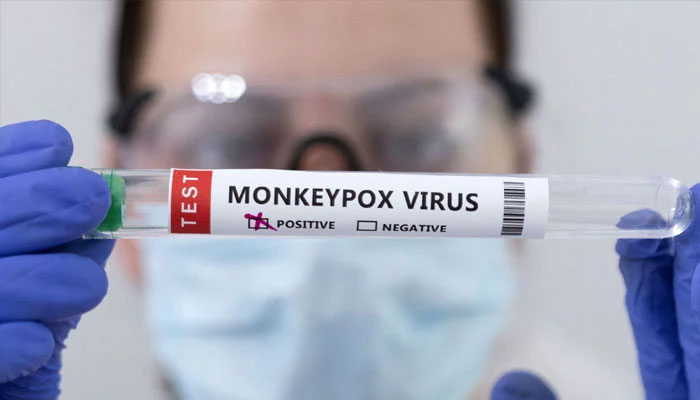NIH, six govt laboratories authorised to conduct mpox tests in provinces
So far, no private laboratories have approached federal authorities to seek permission to conduct Mpox testing, officials confirm
ISLAMABAD: In response to growing global concerns over Mpox, federal health authorities Monday said that only a select few institutions and laboratories are authorized to conduct testing for the virus.
As of now, only the National Institute of Health (NIH) and six government laboratories in the provinces and federal territories across the country have the official mandate to carry out Mpox tests, they added.
These directives were issued after doctors at the Pakistan Institute of Medical Sciences (PIMS) in Islamabad asked a suspected patient to get tested for Mpox at a private lab in Islamabad, which took her nasopharyngeal swab for Mpox testing. This method is not recommended for diagnosing Mpox, they added.
Officials in the federal health ministry stated that the designated, authorized laboratories for Mpox diagnosis are strategically located in Islamabad, the capitals of all four provinces, as well as in Azad Kashmir and Gilgit-Baltistan, ensuring a geographically balanced network of testing facilities.
Federal officials emphasized that, at present, no private laboratory in the country is authorized to conduct or declare results for Mpox tests. This decision has been made to maintain strict quality control and accuracy in the testing process, which is critical to preventing the spread of the virus.
So far, no private laboratories have approached federal authorities to seek permission to conduct Mpox testing, officials confirmed. Speaking to The News, federal health officials stressed the importance of using the “gold standard” testing protocol for Mpox, which involves obtaining skin samples for polymerase chain reaction (PCR) testing.
This method is considered the most reliable for detecting the presence of the virus. The emphasis on standardized testing procedures reflects the government’s commitment to ensuring the accuracy and reliability of Mpox diagnoses.
Officials further claimed that recent reports indicated two more cases suspected of Mpox infection arrived from abroad in the last two days, one in Islamabad and the other in Peshawar, but both were subsequently tested and found negative. These instances underscore the importance of maintaining stringent border controls and testing protocols, especially given the mobility of populations and the increasing number of cases globally.
Although the number of confirmed Mpox cases in Pakistan remains low, federal and provincial health departments are closely monitoring the situation. Officials added that the government has implemented surveillance systems to quickly identify potential cases and has instructed healthcare facilities to remain vigilant.
Ministry of National Health Services (NHS) officials stated that they have issued guidelines to provincial health departments, healthcare providers, and the public about the symptoms and preventive measures for Mpox. These symptoms typically include fever, rash, and swollen lymph nodes, among others. The ministry has also launched awareness campaigns to educate the public on how to recognize the symptoms of Mpox and the importance of seeking immediate medical attention if they suspect infection.
To prevent the spread of Mpox, the government is also focusing on ensuring that suspected cases are isolated and that contacts of confirmed cases are traced and monitored. The authorities have urged the public to avoid close contact with infected individuals and to practice good hygiene, including frequent hand-washing.
-
 Nancy Guthrie Abduction: Piers Morgan Reacts To 'massive Breakthrough' In Baffling Case
Nancy Guthrie Abduction: Piers Morgan Reacts To 'massive Breakthrough' In Baffling Case -
 Adam Mosseri Set To Testify In Court Over Social Media Addiction Claims
Adam Mosseri Set To Testify In Court Over Social Media Addiction Claims -
 Will Warner Bros Finalize Deal With Paramount Or Stays Loyal With Netflix's Offer?
Will Warner Bros Finalize Deal With Paramount Or Stays Loyal With Netflix's Offer? -
 Palace Spotlights Queen Camilla For Her Work With Vision-impaired Children A Day After Andrew Statement
Palace Spotlights Queen Camilla For Her Work With Vision-impaired Children A Day After Andrew Statement -
 Kim Kardashian Still 'very Angry' At Meghan Markle, Prince Harry
Kim Kardashian Still 'very Angry' At Meghan Markle, Prince Harry -
 Texas Father Guns Down Daughter After Heated Trump Argument
Texas Father Guns Down Daughter After Heated Trump Argument -
 Andrew, Sarah Ferguson Quietly Adopts New Strategy To Control Public Narrative
Andrew, Sarah Ferguson Quietly Adopts New Strategy To Control Public Narrative -
 Harry Styles Refuses To Apologise For High Tour Ticket Prices In Rude Response: Source
Harry Styles Refuses To Apologise For High Tour Ticket Prices In Rude Response: Source -
 Ariana Grande Opens Up About ‘dark’ PTSD Experience
Ariana Grande Opens Up About ‘dark’ PTSD Experience -
 Angelina Jolie Says It Loud: 'Scars Define My Life'
Angelina Jolie Says It Loud: 'Scars Define My Life' -
 Climate-driven Wildfires Scorch Some Of World’s Oldest Trees In Patagonia
Climate-driven Wildfires Scorch Some Of World’s Oldest Trees In Patagonia -
 King Charles’ Ignorance Over Andrew & Jeffrey Epstein Not True? Foreign Office, MI6’s Work Comes Out
King Charles’ Ignorance Over Andrew & Jeffrey Epstein Not True? Foreign Office, MI6’s Work Comes Out -
 Police Detained 'innocent' Man In Nancy Guthrie's Kidnapping
Police Detained 'innocent' Man In Nancy Guthrie's Kidnapping -
 Co-founders Of Elon Musk's XAI Resigned: Here's Why
Co-founders Of Elon Musk's XAI Resigned: Here's Why -
 Dakota Johnson Reveals Smoking Habits, The Leading Cause Of Lung Cancer
Dakota Johnson Reveals Smoking Habits, The Leading Cause Of Lung Cancer -
 FAA Shuts Down El Paso Airport, Flights Suspended For 10 Days: Here’s Why
FAA Shuts Down El Paso Airport, Flights Suspended For 10 Days: Here’s Why




